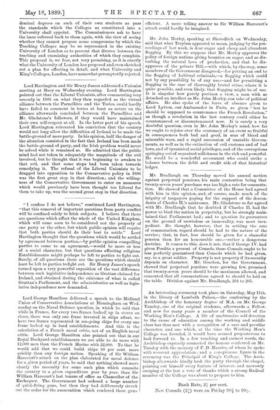"I confess I do not believe," continued Lord Hartington, "that
this removal of important questions from party conflict will be confined solely to Irish subjects. I believe that there are questions which affect the whole of the United Kingdom, which will come soon to be considered not the property of one party or the other, but which public opinion will require that both parties should do their best to settle." Lord Hartington thought that the questions which would be settled by agreement between parties,—by public opinion compelling parties to come to an agreement,—would be more or less of a social character, but that questions affecting religious Establishments might perhaps be left to parties to fight out. Surely-, of all questions these are the questions which should least be left to parties to fight out. Sir Henry James's speech turned upon a very powerful exposition of the vast difference between such legislative independence as Grattan claimed for Ireland, and obtained during the existence of what is called Grattan's Parliament, and the administrative as well as legis- lative independence now demanded.


































 Previous page
Previous page